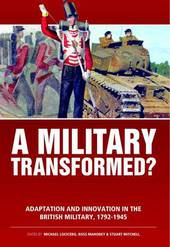
|
A Military Transformed?: Adaptation and Innovation in the British Military, 1792-1945
Paperback
Main Details
| Title |
A Military Transformed?: Adaptation and Innovation in the British Military, 1792-1945
|
| Authors and Contributors |
Edited by Michael LoCicero
|
|
Edited by Ross Mahoney
|
|
Edited by Stuart Mitchell
|
| Series | Wolverhampton Military Studies |
|---|
| Physical Properties |
| Format:Paperback | | Pages:256 | | Dimensions(mm): Height 234,Width 156 |
|
| Category/Genre | British and Irish History
Military history |
|---|
| ISBN/Barcode |
9781911096702
|
| Classifications | Dewey:355.03304109034 |
|---|
| Audience | |
|---|
| Illustrations |
10 tables
|
|
Publishing Details |
| Publisher |
Helion & Company
|
| Imprint |
Helion & Company
|
| Publication Date |
15 October 2016 |
| Publication Country |
United Kingdom
|
Description
Between 1792 and 1945, the character of warfare changed. Battalions standing shoulder to shoulder during the Napoleonic era gave way to the industrialised, modern armies of the First and Second World Wars. The organisation and operational methods of the major military powers dramatically altered during this period and the British forces were no different. From the transition of the Royal Navy's ships to oil from coal to the creation of an independent air force in 1918, the British military pioneered key innovations that affected the character of war on land, sea and air. To date, many commentators and historians have focused on contemporary debates or specific historical examples. A Military Transformed? Adaptation and Innovation in the British Military from 1792 to 1945 brings many of these debates together and forms a broader picture. The complexity of change in the British Army, Royal Navy and Royal Air Force is explored in chapters drawing on new and original research. Examples covered include the British military performance in the Napoleonic Wars, the developments of the Army medical services in the late-nineteenth century, the Royal Navy's introduction of the Whitehead torpedo in the 1870s, air power doctrine on the eve of the First World War, British Army reorganisation in 1918 and amphibious operations in the Second World War. Spanning the period of both peace and war this ground-breaking survey illustrates the different drivers for transformation and innovation. Culture, technology, tactics, organisation, personality, doctrine, command and context have all shaped the speed and development of the British Forces. A Military Transformed? Adaptation and Innovation in the British Military from 1792 to 1945 shows that while it was neither a revolutionary nor a conservative organisation, the British military certainly evolved and reacted to the character of warfare in the nineteenth and early twentieth centuries; even if change, at times, did not come easily.
Author Biography
Michael LoCicero is an independent scholar who earned his PhD at the University of Birmingham in 2011. Previously employed as a contracted researcher by the National Archives and the Soldiers of Oxfordshire Trust, he is currently engaged in a wide-ranging number of academic and editorial activities. His chapter on Brigadier-General Edward Bulfin appeared in Spencer Jones (ed.) Stemming the Tide: Officers and Leadership in the British Expeditionary Force 1914 in 2013. This is his first book. Ross Mahoney is a PhD candidate at the Centre for War Studies, University of Birmingham where he is researching leadership development in the inter-war Royal Air Force. His research interests include air power studies, leadership and military culture. He is the convenor of The Second World War Military Operations Research Group and is West Point Fellow in Military History. / Stuart Mitchell is a Visiting Lecturer and Secretary of the Centre for War Studies at the University of Birmingham where he is a PhD candidate specialising in learning and transformation in the British Army during the First World War. He is also a member of the British Commission for Military History, Western Front Association and the Institute for Historical Research.
ReviewsThis book really helps explain why military experts chose a course of action in the way that they did, and I thoroughly recommend it. * Miniature Wargames - Chris Jarvis *
|